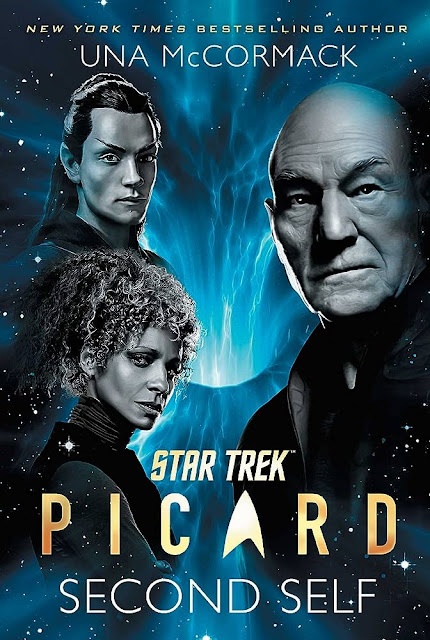The paperback edition of Una McCormack's New York Times bestseller novel Star Trek: Picard: Second Self beamed down to retailers yesterday from Gallery Books. It's the fourth novel based on the Paramount+ streaming series Star Trek: Picard (the third and final season ended earlier this year).
Una McCormack is no stranger to science fiction as she has penned ten other Star Trek novels: The Locus Flower (part of The World of Star Trek: Deep Space Nine), Hollow Men, The Never-Ending Sacrifice, Brinkmanship, The Missing, the New York Times bestseller The Fall: The Crimson Shadow, Enigma Tales, Discovery: The Way to the Stars, the USA Today's bestseller Picard: The Last Best Hope, and Discovery: Wonderlands. She's also written five Doctor Who novels from BBC Books: The King's Dragon, The Way Through the Woods, Royal Blood, Molten Heart, and All Flesh is Grass.
At first glance, Second Self is a "Raffi"-centric story—a character (played by Michelle Hurd) I despised until she was somewhat likable in the final season of Star Trek: Picard—but it's actually a Garak story. For those non-Star Trek fans, Elim Garak is a character (played by Andrew J. Robinson) from Deep Space Nine: a disgraced Cardassian spy who lived in exile on Deep Space Nine, working as a tailor.
Second Self begins in 2399, shortly after Jean-Luc Picard's return from the events on Coppelius (Star Trek: Picard — "Et in Arcadia Ego") and before he assumes the position of vice-chancellor at Starfleet (Star Trek: Picard — "The Star Gazer"). Raffi Musiker must decide between returning to her previous life as a Starfleet Intelligence officer and something a little more subdued, like possibly teaching at the academy. However, when a communication from an old contact—a Romulan spy—is received pleading for emergency assistance, the decision is made for her. Raffi chooses to undertake the crucial task with the support of Elnor and Picard, and she discovers immediately that the past never truly dies.
I'll stop with the synopsis here to avoid spoiling too much for anyone who hasn't read the book. Let's just say that Garak, a former Cardassian terrorist, is the target of Raffi's mission. The story takes place in three eras: 20399 after Coppelius, 2376 following the Dominion War, and 2340 under the Occupation.
I went into Second Self prepared to despise it but ultimately enjoyed it by the final page. For some reason, I expected it to be more action-oriented, but the narrative is character-focused. I don't care much for the character Raffi, but I liked knowing more about her past. The finest part of this story is, of course, Elim Garak, who is one of my favorite Deep Space Nine characters. Things get a little emotional toward the end of the novel.
The few f-bombs were the only thing I didn't like, though. That kind of language does not belong in Star Trek, yet it has found its way into modern Trek.
Overall, Star Trek: Picard: The Second Self was an unexpectedly deep and complex book. Although there were several unnecessary f-bombs, Una McCormack did excellent work with the prose, characters, and narrative. ╌★★★★✰







No comments:
Post a Comment
“The plot thickens… especially when you comment.” 〜B.J. Burgess